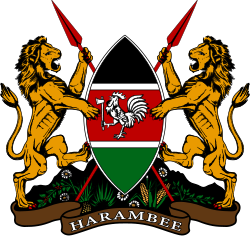Appointment and tenure of office
Before the enactment of the Constitution of Kenya 2010, the president appointed the chief justice without any interview process or parliamentary approval. The chief justice did not enjoy security of tenure, and could be dismissed at the pleasure of the president.
Under the new Constitution, the chief justice is formally appointed by the president but is selected by the Judicial Service Commission following a competitive process involving a vacancy announcement, shortlisting of applicants and interviews. In order to be appointed as the chief justice, a person must have at least fifteen years experience as a legal practitioner. At the end of the interviews, the Judicial Service Commission selects one individual whose name is forwarded to Parliament for vetting and approval. If Parliament gives the candidate the green light, he is then formally appointed by the president.
In an attempt to give the president more leeway in appointing the chief justice, the Jubilee Coalition, while in power, pushed through a legislative amendment which required the Judicial Service Commission to provide three qualified individuals from which the president would appoint one as the chief justice. [3] However, the constitutional court declared the amendment unconstitutional, and the new constitutional provision remains the only legal process of appointment of the chief justice. [4]
Similar to other judges in the judiciary, the chief justice serves until they reach 70 years, with an option for early retirement once they reach the age of 65. However, no matter their age, an individual may not serve for more than ten years as chief justice. As such, an individual who serves for ten years as chief justice must retire from the office of the chief justice even if they are not yet 70 but may opt to stay on the Supreme Court as an associate justice until they reach 70.
The chief justice may be removed from office if a tribunal appointed to inquire into their conduct finds that they no longer legally fit for office.
In the event of a vacancy in the office of the chief justice, the deputy chief justice performs the role in an acting capacity until a new chief justice is appointed. Where the deputy chief justice position is also vacant, the senior-most associate justice of the Supreme Court will act as the president of the Supreme Court until a chief justice is named, and the next senior-most as the deputy president of the Supreme Court. An example of this occurred in 2016, when the senior associate justice Mohamed Ibrahim acted as the president of the Supreme Court following the early retirement of Chief Justice Willy Mutunga who turned 69 in June 2016, and the retirement of Deputy Chief Justice Kalpana Rawal who turned 70 in January 2016. [5]
Duties
The chief justice performs a wide range of judicial, administrative and ceremonial duties provided for under the Constitution and various statutes.
As the president and head of the Supreme Court of Kenya, the chief justice sits on the bench of the court and gives directions on which associate justices are to preside over cases. As the chairperson of the Judicial Service Commission, he/she has a lead role in setting policies for the administration of justice and the running of the judicial arm. The chief justice also takes part in the selection and recruitment of judges and magistrates who are appointed by the Judicial Service Commission.
He/she is also the administrative head of the judiciary, although the chief registrar of the judiciary is responsible for oversight over administrative matters.
The chief justice also presides over the swearing-in of the president, the deputy president and many other government officials and ceremoniously administers the oath that newly qualified lawyers take as they are admitted to the Roll of Advocates.
This page is based on this
Wikipedia article Text is available under the
CC BY-SA 4.0 license; additional terms may apply.
Images, videos and audio are available under their respective licenses.

